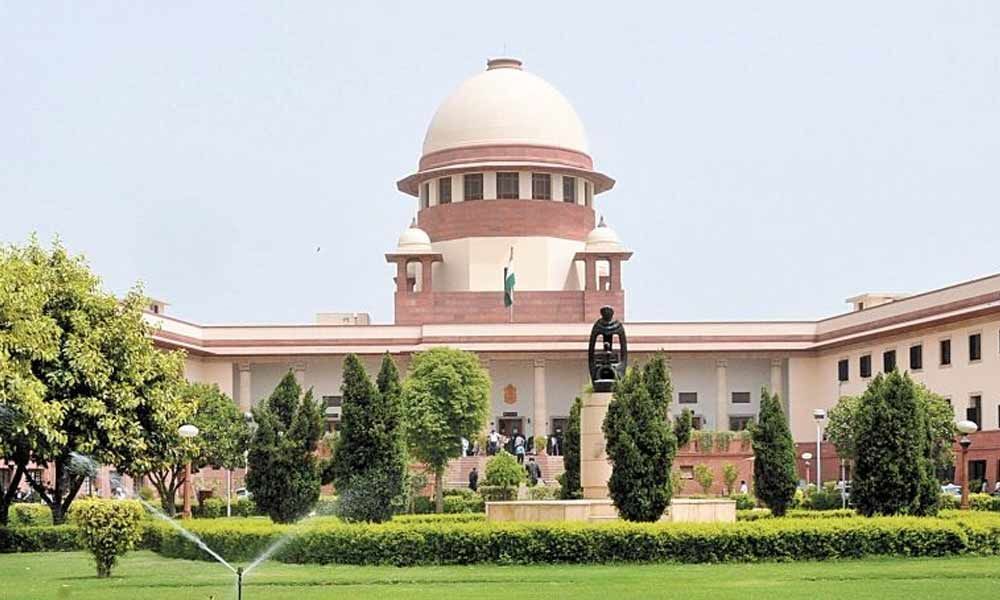Live
- New Mizoram Guv likely to take charge next week
- Barroz 3D Movie Review: A Visual Treat for Mohanlal Fans, Mixed for Others
- Donate Blood, Save Lives: BJP Hosts Mega Blood Donation Camp in Aiza
- Azerbaijani Airliner Crashes Near Aktau, Kazakhstan: 32 Survive, Over 30 Feared Dead
- Union Minister Bandi Sanjay Kumar to Visit Jogulamba Gadwal District on December 27, 2024
- Gadwal Lawyers' United Protest: Opposition to District Court Relocation Gains Momentum
- Christmas Celebrations in Jogulamba Gadwal: A Festival of Unity, Charity, and Joy
- Lawyers Seek MP DK Aruna’s Intervention to Prevent District Court Relocation
- Israel, Hamas trade blame for delays in reaching Gaza ceasefire deal
- PM Modi, President Murmu extend Hanukkah greetings to Israeli counterparts
Just In
SC to resume day-to-day hearing in Ram Janmabhoomi-Babri Masjid case today


The crucial day-to-day hearing in the politically sensitive Ram Janmabhoomi-Babri Masjid case in the Supreme Court would enter the fifth day on Tuesday with the counsel for the deity, 'Ram Lalla Virajman', recommencing arguments for claim over the entire 2.77 acres of disputed land in Ayodhya.
New Delhi: The crucial day-to-day hearing in the politically sensitive Ram Janmabhoomi-Babri Masjid case in the Supreme Court would enter the fifth day on Tuesday with the counsel for the deity, 'Ram Lalla Virajman', recommencing arguments for claim over the entire 2.77 acres of disputed land in Ayodhya.
The hearing before a five-judge Constitution bench, headed by Chief Justice Ranjan Gogoi, assumed significance following its query on Friday as to whether anyone from the 'Raghuvansha' (descendants of Lord Ram) dynasty still resides in Ayodhya.
"We are just wondering if anyone from the 'Raghuvansha' dynasty is still living there (at Ayodhya)," the bench, also comprising Justices SA Bobde, DY Chandrachud, Ashok Bhushan and SA Nazeer, had said.
Although senior advocate K Parasaran, appearing for the deity, could not answer the query, BJP lawmaker Diya Kumari, a member of the erstwhile Jaipur royal family, claimed on Sunday that her family has descended from Lord Ram's son Kush.
"The court has said where are the descendants of Lord Ram... Descendants of Lord Ram are all over the world, including our family who descended from his son Kush," the MP from Rajsamand in Rajasthan said, adding that Ram's descendants are all over the world and the dispute in Ayodhya should be resolved soon.
After such claims from Rajasthan's erstwhile royal family of Mewar as well, state Congress spokesperson Satendra Raghav on Monday also claimed that his family descended from Ram. "The Raghav Rajputs are the real descendants of Ram," he said.
On the fourth day of the hearing, Parasaran had responded to the Supreme Court's query as to how the 'Janmasthanam' (birth place of deity) can be regarded as a "juristic person" having stakes as a litigant in the case.
"The idol is not necessary in the Hinduism for a place to be regarded as a temple," he had said, adding, "Hindus do not worship gods in any definite form, rather they worship them as divine incarnation having no form."
The court, meanwhile, had made it clear that it would continue with the day-to-day hearing of the land dispute case and would consider granting midweek breaks to senior advocate Rajeev Dhavan, and counsel for Muslim parties, including litigant M Siddiq, to prepare arguments.
Earlier, the bench had asked the counsel for the deity as to how the birth place of Ram can be regarded as a "juristic person" having stakes as a litigant in the case. It had said that so far as Hindu deities are concerned, they have been legally treated as juristic person which can hold properties and institute, defend and intervene in lawsuits. However, it had asked as to how 'Janamsthanam' can file the case in the land dispute as party.
Parasaran had said that even the birth place of the deity can be considered as a juristic person.
The law suit filed by the deity in the Ayodhya case has also made the birth place of Lord Ram as co-petitioner and has sought claim over the entire 2.77 acre of disputed land at Ayodhya where the structure was razed on December 6, 1992.
Fourteen appeals have been filed in the apex court against the 2010 Allahabad High Court judgment, delivered in four civil suits, that the 2.77-acre land in Ayodhya be partitioned equally among the three parties -- the Sunni Waqf Board, the Nirmohi Akhara and Ram Lalla.
On December 6, 1992, the Babri Masjid, constructed at the disputed site in the 16th century by Shia Muslim Mir Baqi, was demolished.

© 2024 Hyderabad Media House Limited/The Hans India. All rights reserved. Powered by hocalwire.com






